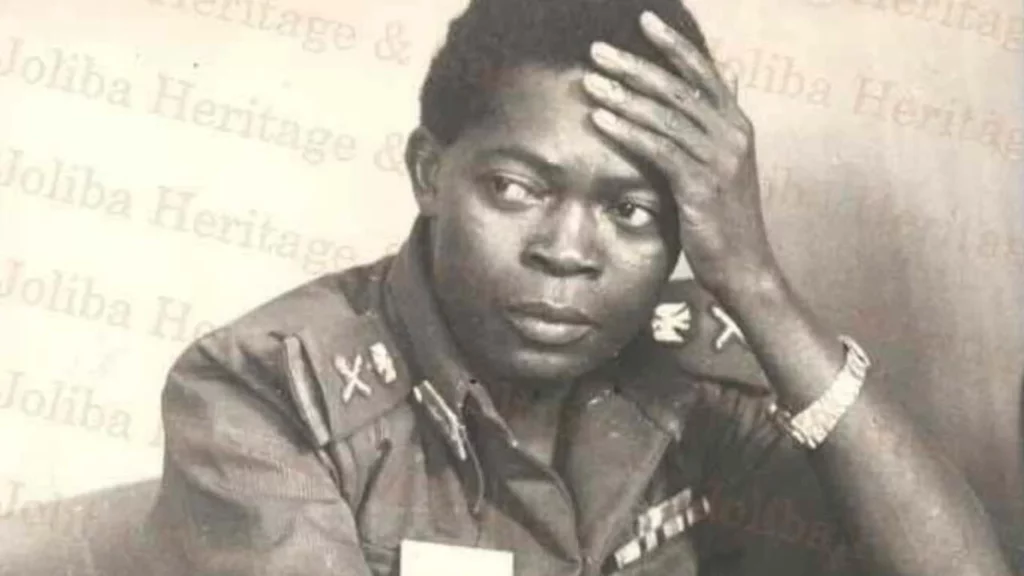Langtang is reputed to be the home of the army generals; the people are often referred to as the “Langtang Mafia“ in the heydays of the military. Those in that group include some of the most powerful and influential army generals and officers the Nigerian army has ever produced in history.
The Tarok People of Langtang in Plateau State are famous for producing senior military officers. The fact that the Tarok people are fond of military service is a topic that should be looked into closely and examined.
The Tarok tribe in Langtang North and South local government areas of Plateau State is said to be a tribe of warriors and known as the ethnic group with the highest number of military personnel in the North Central.
Every household/family (nuclear or extended) in Langtang has military personnel; it could be a senior or junior officer/other ranks, a fact that has been confirmed to be in fact true over the years.
The question remains, Why do Langtang men have so much interest in the military?
Many believe that the two local government areas stand out as the only communities with the highest number of retired military, officers, in the country. Some will argue that there are more Army Generals in the town than in any other single ethnic group not only in the entire North Central but in the nation.
Their momentous period and explosive awareness in the military date back to the regime of President Ibrahim Babangida, when they were referred to as the ‘Langtang Mafia’. Their military personnel, particularly the senior officers, held various positions during the military junta, while others announced military coups. By and large, the Langtang military personnel are dreaded.
Some of the greatest military men in the country from Langtang include the likes of Lt Gen Joshua Nimyel Dogonyaro (retired, deceased), Lt Gen Jeremiah Useni (retired), Lt Gen Domkat Bali (retired and deceased), and Brig Gen John Nanzip Shagaya (retired and former Senator, deceased), and Lt Gen Muhammad A. Najib (retired) among others. Although the above has retired from service, some of them have continued to remain in the limelight, albeit politically even after death.
By and large, whenever ‘Langtang’ is mentioned, the first thing that comes to mind (of those who know them properly) is a tough, fearless, and strong people, hence their military exploits and doggedness.
General Useni was very prominent in the All Nigeria Peoples’ Party (ANNP) as a member of the Board of Trustees, John Shagaya contested for the Upper house of the National Assembly under the ANPP, the late Joe Garba had aspired for the same slot in 1999 but lost while Domkat Bali remained a power broker of some sorts, Joshua Dogonyaro has preferred to remain at the background playing the role of an arbiter.
Among the great generals from Langtang are the Late General Domkat Bali, the Late Joseph Garba, Jeremiah Useni, Joshua Dogonyaro, Late John Shagaya, Jonathan Temlong, Musa Gambo, Yakubu Rimdam, and Ishaku Pennap. Others are Air Marshal Jonah D. Wuyep, Air Commodore Bernard Banfa, and General Muhammad A. Najib.
Just to mention a few:
- Domkat Bali was the Chairman Joint Chiefs of Staff and Minister of Defence and was the Ponzhi Tarok before he died.
- Yakubu Rimdan served in the Guards Brigade Dodan Barracks, Ikoyi Lagos, during General Yakubu Gowon’s regime.
- Jon Temlong was a military strategist who served in many foreign peacekeeping missions.
- Jeremiah Useni was the Minister of the Federal Capital Territory and has held several positions.
- Late John Shagaya also held several positions in the military before retiring, and that applies to the others.
It was said that the fearless strength and cultural dynasty were almost exercised when Domkat Bali, the Ponzhi Tarok, passed on and they alleged that the military had taken over the burial without allowing them to perform their traditional burial rites for their traditional ruler.

But there were several interventions and the matter was settled amicably, thereby allowing a hitch-free burial, devoid of violence.
A native of Langtang, Gwamkat, said their fearless and warrior nature endears them to rugged professions like the military, and that they always wish that every household would produce military personnel.
Gwamkat said the Tarok people are determined to the extent that should the military be left for them to control, they can fit in and do it perfectly. She went on to hail the present military personnel, saying they are trying their best to tackle the insecurity and that more can still be done this year.
Another Langtang native, Golok Nanmwal, said a typical Langtang family teaches their children about bravery and all they should do to be strong and resilient in life.
And with such mentality, he said, a Tarok child grows up to be strong, fearless, and daring, adding that they have a defensive attitude and that is why they have been in the military for a while now and have been producing great military personnel till date.
According to him, the Tarok child is being taught from childhood that the world is a tough place and you have to live up to the toughness of the world, and so the children grow up with that mentality. He said if, given the opportunity, the Tarok people can tackle the insecurity in the nation.
Another Tarok lady, Anna Elizabeth Nancwat emphasised the disciplinarian nature of Tarok men and how it’s only appropriate to channel it into the military.
In her words, she said: “A Tarok man by nature is a no-nonsense man right from birth, he has principles he set out for himself and all the people in his household, what else would you have that kind of temperament channelled to than the military?”
Also, a Langtang native, Patience Dombin, said the people have always been striving hard to maintain the feat/historical perspective as the community with the highest number of soldiers and the ‘Home of Generals’ in the country.
She said most of the retired generals actually helped the others to get recruited then, adding that such gestures dwindled, but that the people are struggling to get into the military on their own now.
Sandra Manko Bindip on her own part said her father was a soldier and resigned in 1979, and that her elder brother was also a soldier and resigned this year.
She said they both resigned as Warrant Officers, adding that her family is related to Gen. Joshua Dogonyaro.
Bindip explained that her father encouraged her brothers to join the Nigerian Army because he believed in the military, and also because the military profession exudes the fearlessness and ruggedness that is synonymous with the Tarok man.
She said apart from the fact that the Tarok people have been in the military and still wish to continue assisting their wards to get recruited because of the characteristic bond between the military and the Tarok lifestyle, the military also serves as a source of employment for their people.
However, Jane Londir’s opinion on why we have lots of Tarok people in the military is a little bit different from others, she emphasized the fact that most Tarok people have high self-esteem, they see themselves as very important and deserve to be in control.
This yearning and proud understanding of who they are makes them want power and never want to be looked down upon, they seek to prove their strength, doggedness, agility, and domineering nature by maximizing it in the military,
Jane concluded by emphasising the fact that it’s a noble way of channelling one’s energy, at least it is not used for robbery or terrorism.
Aside from all this, in our article; The Tarok People of Plateau State, we emphasised how the Tarok people have a strong cultural lifestyle.
They remain arguably the tribe in North Central to have strongly upheld their cultural values and attendant ancestral manifestations.
It is common knowledge that the Tarok people (i.e. Langtang) have a running battle with the Hausa/Fulani-dominated areas of Shendam and Wase LGAs.
It’s quite difficult to actually pinpoint the genesis of the enmity between these peoples. What is certain is that the September 7, 2001 crisis which claimed thousands of lives and which was basically between the indigenes and the Hausa/Fulani settlers opened up a sore wound.
To some people, the ethnoreligious carnage was a keg of gunpowder, which exploded, and the dust still lingers even now.
The Fulani have always accused the Tarok of killing their cows and cattle while the Tarok have consistently maintained that they are being attacked by the Hausa/Fulani without being provoked.
Langtang is located in the southern part of Plateau State and is connected to Tunkus, Shendam, Kanam, and Wase through access roads.
The local government areas principally affected include Langtang North, Wase, Shendam, and at a few times Langtang South and Kanam councils.
The BEST way to support us is by providing funding to enable us continue this good work:
Bank: Guarantee Trust Bank (GTBank)
Account Name: Johnson Okunade
Naira Account: 0802091793
Dollar Account: 0802091803
Pounds Account: 0802091810
Euro Account: 0802091827
Business Email — hello@johnsonokunade.com


Beautiful write up!